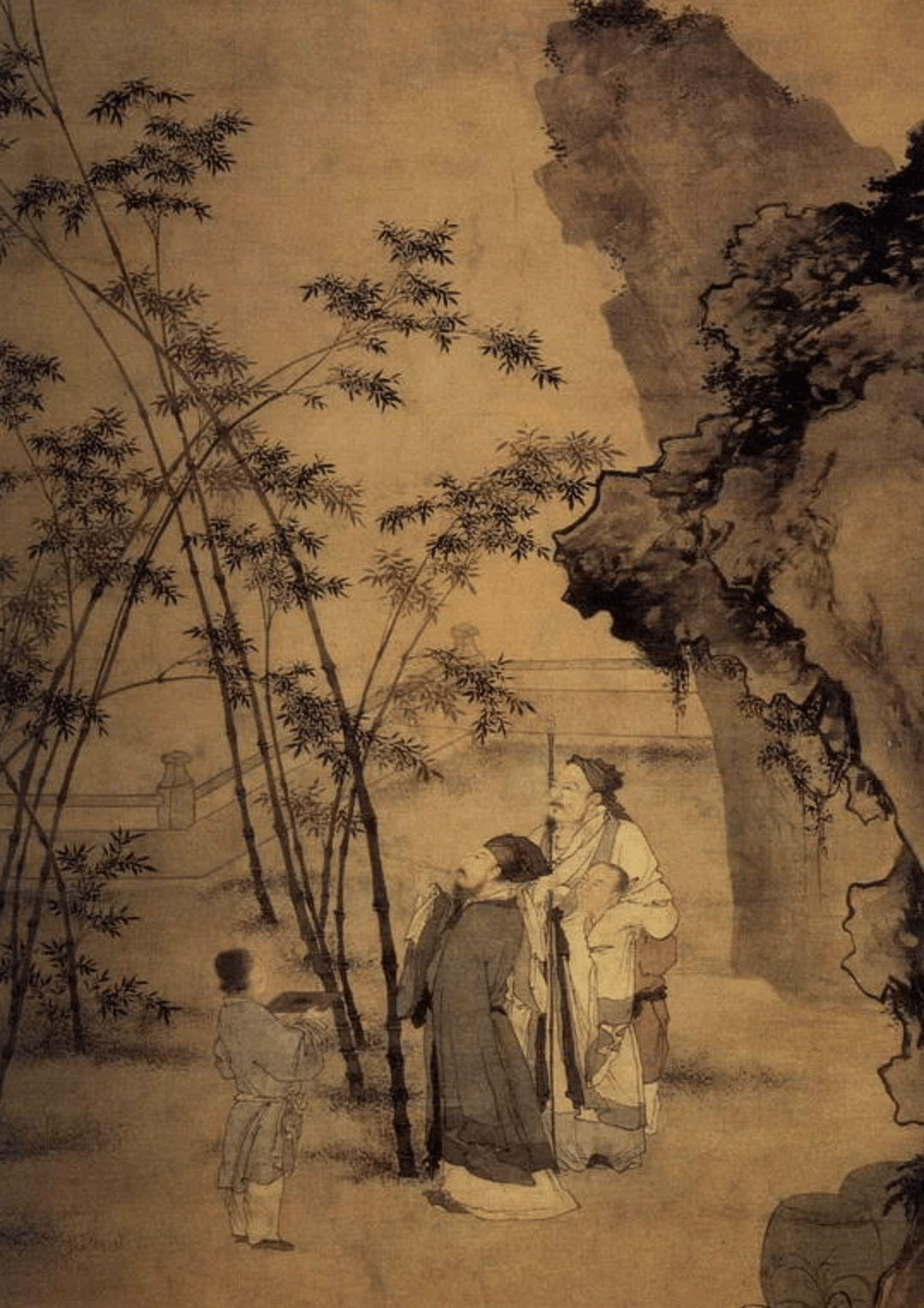Ma Shilin(馬士麟), a scholar from Changzhou(常州), once recounted a personal experience:
When he was young, he and his father studied in the northern tower. From their window, they could see the outdoor flower platform of an old man named Wang who sold chrysanthemums. One day, Ma Shilin woke up early, leaning against the window and peering below. The sky was gradually brightening, and he saw Wang ascending the platform to water the flowers. After finishing, as Wang was about to descend, a man carrying two buckets of manure arrived, wanting to assist Wang. Wang’s face showed displeasure, refusing to let the man up, but the man insisted. So, they both jostled on the slope of the platform. Unfortunately, rain started, making the terrace slippery. The slope was steep and high, and Wang pushed the man, who couldn’t withstand the force and fell from the platform. Wang hurried to help, but the man, pinned under the manure buckets, couldn’t get up. With a push, he gasped his last breath.
Fearing repercussions, Wang silently dragged the man’s body by his feet from the back door to the riverbank, placing the buckets beside him. He returned home, shut the door, and went back to sleep. Though young, Ma Shilin realized the gravity of the situation and refrained from discussing it further, quickly closing the window and leaving. As the day brightened, news spread of a person found dead by the riverside. The village officials reported to the authorities.
Nine years passed. Ma Shilin, now twenty-one and having achieved scholarly status, faced poverty due to his father’s death. He started teaching students in the same northern tower where he studied before. At that time, Liu Wulong was the inspector of Jiangsu. To prepare for an exam, Ma Shilin woke up early, opening the window to revise his studies. In the distance, he spotted someone carrying two buckets, the same man who had died before. Alarmed, he thought the man came for revenge against Wang, the chrysanthemum seller. After a while, seeing the man pass Wang’s house without entering, heading in another direction towards a wealthy family named Li’s house, Ma Shilin found it suspicious. He followed the man into the Li household. The servants were flustered, mentioning their mistress was giving birth and they were going to call a midwife. When asked if they saw a man with two buckets, they denied it. Suddenly, a maid emerged, announcing the birth of a son, negating the need for a midwife. Ma Shilin realized the man had come to Li’s house for a new life, not for revenge. Yet, he found it odd for a man of manure to have such good fortune. From then on, he observed the actions of Li’s son closely.
Seven years later, Li’s son, disinterested in studying, became fond of raising birds. Meanwhile, Wang, in his eighties, remained healthy and enthusiastic about growing chrysanthemums.
One day, Ma Shilin, again early at the window, witnessed Wang watering the flowers on his platform while Li’s son released pigeons from his rooftop. Suddenly, a dozen pigeons flew to the railing of Wang’s platform. Despite Li’s son calling them repeatedly, the pigeons remained still. In desperation, he threw a stone, accidentally hitting Wang. Startled, Wang fell from the platform, struggled to get up for a long time, stretched out, and passed away. Li’s son, terrified, quietly closed the window. When it was bright outside, Wang’s son and grandson found him. Seeing it was an accidental fall, they wept bitterly and arranged the burial.
This story was recounted by Mr. Liu Sheng’an, a resident of Changzhou. He added, “A man who carried manure and an old man, their karmic retribution intertwined so intricately, yet justly received. Those involved were unaware, but Ma Shilin, the observer, saw it all. Events of fortune and misfortune always have a cause and effect, with no room for error. Unfortunately, no one can calmly observe from the sidelines.
Translated from 《旁觀因果》 in 《子不語》:
常州馬秀才士麟,自言幼時從父讀書北樓,窗開處,與賣菊叟王某露臺相近。一日早起,倚窗望,天色微明,見王叟登台澆菊,畢,將下台。有擔糞者荷二桶升臺,意欲助澆。叟色不悅,拒之;而擔糞者必欲上,遂相擠於臺坡。天雨台滑,坡仄且高,叟以手推擔糞者,上下勢不敵,遂失足隕臺下。叟急趨扶之,未起,而雙桶壓其胸,兩足蹷然直矣。叟大駭,噤不發聲,曳擔糞者足,開後門,置之河干,復舉其桶置尸傍,歸閉門復臥。馬時年幼,念此關人命事,不可妄談,掩窗而已。日漸高,聞外轟傳河干有死人,里保報官。日午,武進知縣鳴鑼至。仵作跪啟:「尸無傷,係失足跌死。」官詢鄰人,鄰人齊稱不知。乃命棺殮加封焉,出示招尸親而去。
事隔九年,馬年二十一,入學為生員。父亡,家貧,即於幼時讀書所招徒授經。督學使者劉吳龍將臨歲考,馬早起溫經,開窗,見遠巷有人肩兩桶冉冉來。諦視之,擔糞者也。大駭,以為來報叟仇。俄而過叟門不入,別行數十步,入一李姓家。李頗富,亦近鄰而居相望者也。馬愈疑,起尾之,至李門。其家蒼頭踉蹌出曰:「吾家娘子分娩甚急,將往招收生婆。」問:「有擔桶者入乎?」曰:「無。」言未畢,門內又一婢出曰:「不必招收生婆,娘子已產一官人矣。」馬方悟擔糞者來託生,非報仇也。但竊怪李家頗富,擔糞者何修得此?自此,留心訪李家兒作何舉止。
又七年,李氏兒漸長,不喜讀書,好畜禽鳥;而王叟康健如故,年八十餘,愛菊之性,老而彌篤。一日者,馬又早起倚窗,叟上臺灌菊,李氏兒亦登樓放鴿。忽十餘鴿飛集叟花台欄杆上。兒懼飛去,再三呼鴿不動。兒不得已,尋取石子擲之,誤中王叟。叟驚,失足隕于臺下,良久不起,兩足蹷然直矣。兒大駭,噤不發聲,默默掩窗去。日漸高,叟之子孫咸來尋翁,知是失足跌死,哭殮而已。
此事聞于劉繩庵相公。相公曰:「一擔糞人,一叟,報復之巧如此,公平如此,而在局中者彼此不知,賴馬姓人冷觀歷歷。然則天下事吉凶禍福,各有來因,當無絲毫舛錯,而惜乎從旁冷觀者之無人也!」
🎨 《東坡題竹圖軸》杜堇 明


Comments are closed.